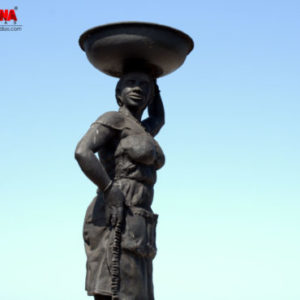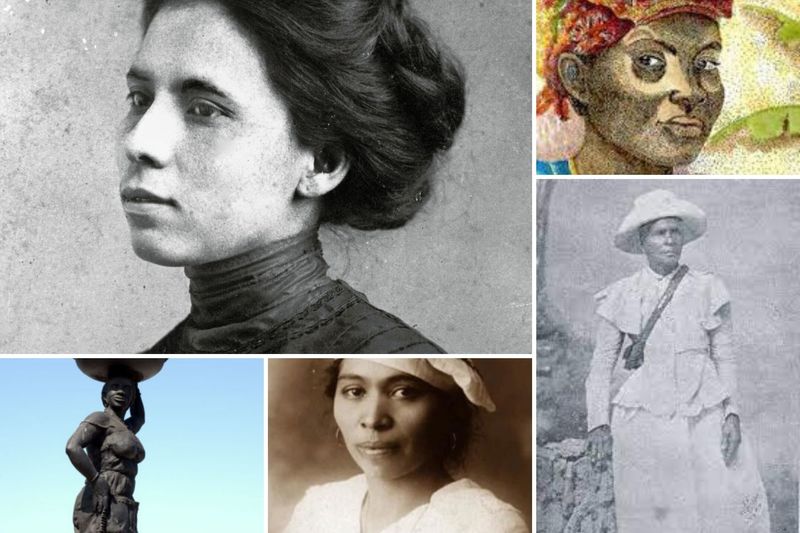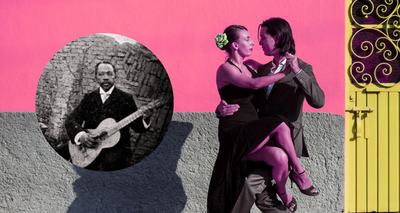Today, we recognize the many well-known Latinas who have, before us, carved the path towards success, guided us in times of injustice, and showed us how to be resilient. Inspiring historical Latinas may not be on your radar, but remember them!
Many of these women have had tías, mothers, and great-grandmothers who had inspired them, and showed them the ability to recognize the strength, and courage that lies within themselves.
We have found, and are highlighting inspiring historical Latinas, from centuries ago, who have shown such resilience, and strength, but have not been given the necessary recognition, or publicity to further inspire future generations of Latinas.

La Palenquera Heroica – Statue
Polonia, La Palenquera Heroica
The harsh sounds of water crashing onto the rugged terrain of Malambo, Colombia was common for a riverside town. The Magdalena river provided water, food, and transportation for the people of Malambo, who have a rich Afro-Colombian history as Palenqueros. They are descended from Africans, who were taken from their homeland of Angola, and Congo, and were the first free African settlement to establish a town in the Americas, known as San Basilio de Palenque.
It was the year, 1581. Polonia, an Afro-Colombian Palenquera, had organized an army of 150 Palenqueros to deter, and confront a Spanish soldier, known as Pedro Ordóñez de Ceballos. In exchange for his life, he needed to ‘grant’ freedom, allow peace, and the right to land for her army. After agreeing to do so, he betrayed his promise to her and organized to persecute her. Today, Polonia is revered as the Freedom Leader of Malambo.
Very little is known about her life, but her courage and strength will always remain a legacy, as one of the prominent heroes, and change-markers of Colombian history.
Lucia Arará
In the year 1628, in the small town of Mariquita, Tolima, Colombia. Lucia Arará and her husband, Pedro de Adames became one of the first free Afro-Colombians to win a lawsuit against their former ‘master’, and Sheriff Juan Adames Callillen. Who wanted to enslave them again. Even after she, and her husband had paid for their freedom already in cash. They decided to take their case to the Royal Audience of the New Kingdom. The court recognized their argument and granted them a Royal Provision, a fine penalty to Juan Adames Callillen if he were to ever harass them again.
Jovita Idár
Born in 1885, she became a woman of many names. A teacher, writer, interpreter, nurse, activist, fighter, and the founding mother of many. Idár had begun working as a journalist for her father, Nicasio Idár’s newspaper, La Crónica. In the year of 1911, she had written numerous articles regarding the Mexican Revolution, and in the following years, she had crossed the border into Mexico to nurse injured soldiers back to health. In the same year, she established The League of Mexicans, an activist and feminist group. Volunteering at local hospitals she translated oral communication between the patients and doctors. During a time when violence towards Mexican-Americans was common in Texas, and the Texas Rangers wanted to shut the press down, Idár had bravely stood in front of El Progreso’s door and defended the press’s right to write.
She had gained a teaching certificate in 1903 and later opened a kindergarten for her community- to combat the lack of resources, and often poor conditions in schools for Mexican-Americans.
Rosa Maria Castellanos, La Bayamesa
Born to enslaved parents in 1834, she became a free Afro-Cubana, by enlisting as a nurse in the 10 years war that granted Cuba independence from Spain. Armed with the knowledge of Cuban preventative medicine, and local botany, she healed the wounds of numerous soldiers and was promoted to the title of Captain of Health. With her husband, she established one of the largest hospitals in Cuba at the time. A statue was made in her honor and stands in the city of Bayamo, Cuba.
Prudencia Ayala
Born in 1885 to an Indigenous family in El Salvador, she grew up to become a writer, a suffragette, an activist, and the First Woman in Latin America to Run for President. She self-taught herself after she finished elementary school, and became a writer for various newspapers in Santa Ana, El Salvador. Where she wrote about global news taking place from around the world, her opinions, predictions, and poems. Even though the government of El Salvador did not recognize a woman’s right to vote until 1950, Ayala established her campaign 20 years earlier. She spoke on the topics of freedom of religion, alcohol, women’s rights, and the structure of government, just to name a few. She led the way to establish and grant women’s rights. After a suffragette movement began when the government rejected Ayala’s nomination, there were calls for a re-evaluation that officially recognized women’s right to vote in El Salvador’s 1950 Constitution.






